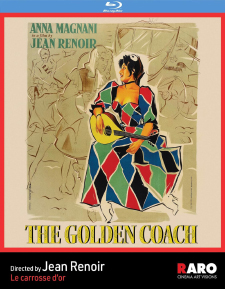Golden Coach, The (Blu-ray Review)

Director
Jean RenoirRelease Date(s)
1952 (February 27, 2024)Studio(s)
Delphinus/Hoche Productions/Panaria Film (Raro Video/Kino Lorber)- Film/Program Grade: A
- Video Grade: A
- Audio Grade: A-
- Extras Grade: B-
Review
Gorgeously photographed in three-strip Technicolor by Claude Renoir, The Golden Coach (French: Le Carrosse d’dor; Italian: La carrozza d’oro, 1952) is part of a trend in European cinema that, for about a decade, roughly 1944-54, paid tribute to the theatrical arts and, through cinematic means, embraced its very artifice. Think of the opening scenes of Laurence Olivier’s Henry V (1944), Marcel Carné’s Children of the Paradise (1945), Powell & Pressburger’s The Red Shoes (1948), and The Tales of Hoffman (1951), and even several early (and later) Ingmar Bergman films.
The Golden Coach, like those films, is a feast for the eyes though neither a critical nor commercial success when it was new, and it still divides viewers today, some finding it beautiful but slow-moving and miscast, others rhapsodized by its pictorial beauty.
That the final result is so unified is nothing short of miraculous, considering this was a French-Italian co-production filmed in English by a French director with an Italian star, supported by American, British, Italian, and Spanish actors. Unusual for a Rome-based production of its time, it was shot in English—director Jean Renoir’s preferred version—recorded with live, synchronized sound. A French-language version, perhaps with French actors replacing some of the English and American ones, was planned but the producers ran out of money, and thus the French and Italian versions are simply dubbed variations of the English cut.
One can only wonder/marvel at the bizarre casting. The second lead, the refined Viceroy trying woo excitable, needy actress Camilla (Anna Magnani), is played by English actor Duncan Lamont, a fine, chameleon-like player who appeared in scads of British films of all kinds and in varied parts, but probably best remembered today for his Cockney roles in Hammer horror and science fiction pictures, most memorably as the diamond drill expert Sladden in Quatermass and the Pit. Even stranger is another suitor, the soldier Felipe, played by American Paul Campbell, who both prior to and after this acted almost exclusively, often uncredited, in cheap Hollywood B-Westerns. Barely a year before his major role in Jean Renoir’s artful film, Campbell played cowardly cowboy Clarence Cassidy in the Moe-Larry-Shemp Three Stooges short Merry Mavericks. Not to be outdone, Dante the Magician, best known for playing himself in the (dreadful) Laurel & Hardy comedy A-Haunting We Will Go, also appears in this French-Italian masterpiece. Who the heck cast this picture?
In essence, The Golden Coach is a play-within-a-play, opening with actors on a stage, framed by a proscenium arch. This segues to 18th-century Peru, where the local Viceroy (Lamont) has purchased an extravagant imported golden coach using public funds, justifying its expense claiming that it’ll be used to awe the peasantry and flatter the local nobility. On the same boat from Italy as the coach is an Italian commedia dell’arte troupe seeking fame and fortune. Don Antonio (Odoardo Spadaro) is its paternal leader, but the star attraction is earth-mother actress Camilla (Magnani), playing the stock role of Columbina. A soldier, Felipe (Campbell), is already in love with Camilla and tags along.
The troupe builds a makeshift theater and performs for the locals, including stoney-faced Peruvian Indians. Others hoot and holler at the performers until the local celebrity, bullfighter Ramon (Riccardo Rioli), applauds Camilla, prompting others to follow suit. Soon enough, Ramon becomes a third rival for her affections. Each raises the stakes, the Viceroy finally trumping all by giving Camilla the prized golden coach, creating a scandal.
Renior’s film meticulously recreates 18th century commedia dell’arte scenes and characters, and captures the rambling lives and vanities of actors, but seems more interested in the divide between the elite class and the troupe, the highest and lowest classes on the social pecking order. The upper classes claim to find the actors and their performances vulgar yet the Viceroy is enchanted by Camilla and unconcerned that his infatuation is ruining his reputation. In the hands of other filmmakers, the Viceroy would have been made the villain of the piece; others would have depicted these star-crossed lovers in tragic terms, neither of which happens here. The screenplay, co-written by Jack Kirkland (Tobacco Road) offers a clever and funny resolution to all the conflict.
The Golden Coach is always beautiful to look at—the sets are particularly gorgeous—though the pacing is a little sluggish considering its thin plot. Conversely, the film is essentially a light comedy, and it showcases Magnani’s talent and innate appeal well. She frets and feeds off the applause of her audiences, speaks frankly, is unpretentious and her reactions to the three men fighting over her are always amusing.
Previously licensed to Criterion, Raro Video’s Blu-ray is a marked improvement, the film restored in 2K “from the original Technicolor trichrome negatives by Digimage,” which presumably means sourced from the black-and-white separation negatives. I’d not seen the Criterion release, which apparently had misalignment issues, but the presentation here (1.37:1 standard, 1920x1080p) is close to perfect start-to-finish. The colors really pop and the image is sharp, steady and with no misalignment issues at all. The DTS-HD Master Audio (2.0 mono) in English is excellent, while the alternate French track isn’t as good. Optional English subtitles are offered and the disc is Region-Free.
Surprisingly, there’s but a single extra, and audio commentary track by film critic Adam Nayman, more a “reading” of the film for those that like that kind of thing.
I wouldn’t put The Golden Coach on my Top 5 by Renoir list but, visually, it’s on par with those Powell & Pressburger and other titles mentioned above, which is high praise.
- Stuart Galbraith IV

